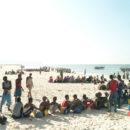Cí´te d’Ivoire: Democracy and civil war – Citizenship and peacemaking

Abu Bakarr Bah is Associate Professor in the Department of Sociology at Northern Illinois University.
This article is published in full in African Affairs: Journal of the Royal African Society
Abstract
The civil war in Cí´te d’Ivoire presents unique features with respect to the causes of civil wars and the nature of peace processes in West Africa. It is a conflict largely driven by concrete political and social grievances over citizenship. In addition, it is marked by a significant effort by the belligerents to take ownership of the peace process and negotiate directly. This article traces the civil war to the politicization of citizenship and ethnicity during the democratization process. It argues that the peace agreements engineered by the international community failed to end the conflict largely because they relied heavily on traditional peace formulas and paid insufficient attention to the underlying issue of citizenship. In contrast, the peace agreement forged by Ivorians has been relatively successful because it directly addressed the citizenship issue and restored domestic ownership of the peace process. This article focuses on the peace process and the intrinsic relation between citizenship and progress toward peace in Cí´te d’Ivoire. In addition, it connects the discourse on democracy in Africa with the salient issue of citizenship and underscores the fluidity of citizenship and democracy in African politics.
***
The conflict in Cí´te D’Ivoire, which erupted in the aftermath of bloody civil wars in Liberia and Sierra Leone and massive political violence in Guinea Bissau, added one more security challenge for the international community.1 Though it is tempting to view Cí´te d’Ivoire as simply another case of ‘trouble in West Africa’ with which the international community has had to deal, the Ivorian civil war significantly departs from the modalities of war and peace commonly found in the region and exhibits two unique features. First, the Ivorian war has a clear political cause that is not reducible to the ambitions of a warlord. In Sierra Leone and Liberia, for example, the civil wars were driven not only by bad governance, but also the ambitions for power and wealth harboured by Charles Taylor and Foday Sankoh.2 Peace only came to these countries after the warlords were taken into custody. The Ivorian case does not neatly fit the common arguments about the political economy of war and failed states used to explain African civil wars.3
In contrast, the Ivorian war is about contested citizenship claims.4 A second distinct feature is domestic ownership of the peace process. Recent African conflicts, such as the wars in Liberia and Sierra Leone, have attracted significant international interventions to ameliorate humanitarian conditions and restore regional security.5 Mindful of the economic centrality of Cí´te d’Ivoire in the region, the international community also swiftly involved, or enmeshed, itself in resolving the conflict. International mediations have not necessarily led to speedy resolution of African conflicts.6 Liberia and Sierra Leone languished for about a decade while the international community made repeated efforts to negotiate and enforce a lasting peace agreement. After more than four years of international mediation in Cí´te d’Ivoire, peace remained elusive. The critical difference is that whereas the stakeholders in Liberia and Sierra Leone were unable to hatch an agreement without heavy involvement of the international community, Ivorians seemed dubious of international intervention and willing to address their own problems.7 They reached out to their compatriots and forged the Ouagadougou Agreement with minimal involvement of international mediators. Most importantly, the agreement directly addressed the underlying citizenship grievance.
The Ivorian case holds useful lessons for dealing with conflicts in Africa. It points to the fluidity of citizenship and the dangers of identity politics in African democracies. Clearly, democratic politics requires a clear definition of citizenship. The Ivorian conflict also exposes significant shortcomings in the way internationally driven peace processes treat the underlying causes of African conflicts. While the issue of citizenship was evident in the discourses surrounding the conflict and peace process, the internationally mediated agreements did not pay sufficient attention to it. This conflict shows that early recognition and profound appreciation of the underlying grievance is critical for forging a durable peace agreement. It also attests to the importance of building creative mechanisms into the peace agreement to rectify underlying grievances. The details of the internationally mediated peace agreements weighed heavily on power sharing, ceasefire, and election modalities at the expense of creating a mechanism to resolve the citizenship issue.
This article examines the way citizenship degenerated into a major political problem in the struggle for democracy after the death of President Felix Houphouí«t-Boigny in 1993, and the way this issue was treated in successive peace agreements. It views citizenship as a political and social issue rooted in the social construction of national identity which evolved out of colonialism, migration, and cultural ties that defy national boundaries. The article underscores the importance of citizenship in African democracy and highlights the security risks of fuzzy and cumbersome citizenship policies. Most importantly, the article makes a critical link between citizenship and the evolution of the Ivorian peace process. It argues that the failure to give sufficient attention to this problem contributed to the collapse of the successive peace agreements engineered by the international community. While the international community was aware of the citizenship problem, as evident in numerous reports, the peace agreements were often mute on the subject.8 Even when citizenship was addressed in the Linas-Marcoussis Agreement, it was largely treated as a legal and administrative problem. The major breakthrough in the peace process only happened when the issue was directly addressed by Ivorians in the Ouagadougou Agreement.
Read in full here
References
1 Adekeye Adebajo, Building Peace in West Africa: Liberia, Sierra Leone, and Guinea-Bissau (Lynne Rienner Publishers, Boulder,CO, 2002); Adekeye Adebajo and Ismail Rashid (eds), West Africa’s Security Challenges: Building peace in a troubled region (Lynne Rienner Publishers, Boulder, CO, 2004); Ademola Adeleke, ‘The politics and diplomacy of peacekeeping in West Africa: the ECOWAS operation in Liberia’, Journal of Modern African Studies 33, 4 (1995), pp. 569–93.
2 Adebajo, Building Peace; John Hirsch, Sierra Leone: Diamonds and the struggle for democracy (Lynne Rienner Publishers, Boulder, CO, 2001); Paul Richards, ‘To fight or to farm? Agrarian dimensions of the Mano River conflicts (Liberia and Sierra Leone)’, African Affairs 104, 417 (2005), pp. 571–90.
3 Paul Collier and Anke Hoeffler, ‘Greed and grievance in civil war’, Oxford Economic Papers 56, 4 (2004), pp. 563–95; William Reno, Warlord Politics and African States (Lynne Rienner Publishers, Boulder, CO, 1999); Ira William Zartman (ed.), Collapsed States: The disintegration and restoration of legitimate authority (Lynne Rienner Publishers, Boulder, CO, 1995); Dwayne Woods, ‘The tragedy of the cocoa pod: rent-seeking, land and ethnic conflict in Ivory Coast’, Journal of Modern African Studies 41, 4 (2003), pp. 641–55.
4 Ruth Marshall-Fratani, ‘The war of “who is who”: autochthony, nationalism, and citizenship in the Ivoirian crisis’, African Studies Review 49, 2 (2006), pp. 9–43; Jean-Pierre Dozon, ‘La Cí´te d’Ivoire entre démocratie, nationalisme et ethnonationalisme”, Politique Africaine 78 (2000), pp. 45–62; John Akokpari, ‘”You don’t belong here”: citizenship, the state and Africa’s conflicts: reflections on Ivory Coast’ in Alfred Nhema and Tiyambe Zeleza (eds), The Roots of African Conflicts: The causes and costs (James Currey, Oxford, 2008), pp. 88–105.
5 Adebajo, Building Peace.
6 Marrack Goulding, ‘The United Nations and conflict in Africa since the Cold War’, African Affairs 98, 391 (1999), pp. 155–66.
7 Interview, European diplomat, Abidjan, 6 June 2008; Interview, African diplomat, Abidjan, 7 June 2008; Daniel Epstein, ‘International involvement in Cí´te d’Ivoire’, Global Policy Forum, <“‰http://www.globalpolicy.org/component/content/article/191/38521.html”‰> (26 August 2008); Mamadou Koulibaly, La Guerre de la France contre la Cí´te d’Ivoire (La Refondation, Abidjan, 2003); Stephen Smith ‘La politique d’engagement de la France í l’épreuve de la Cí´te d’Ivoire’, Politique Africaine 89 (2003), pp. 112–26.
8 There were references to citizenship in several reports, including: UN Security Council, ‘Second report of the Secretary-General on the United Nations operation in Cí´te d’Ivoire’ (S/2004/697, UN, New York, 27 August 2004); UN Security Council, ‘Third progress report of the Secretary-General on the United Nations operation in Cí´te d’Ivoire’ (S/2004/962, UN, New York, 9 December 2004); ‘Country programme: Cí´te d’Ivoire’ United Nations Disarmament, Demobilization and Reintegration, <“‰http://unddr.org/countryprogrammes.php?c=51″‰> (25 September 2009); Peace and Security Council, African Union, ‘Report of the chairperson of the Commission on the situation in Cí´te d’Ivoire’ (23rd meeting of the PSC, 10–11 January 2005, Libreville, Gabon).





